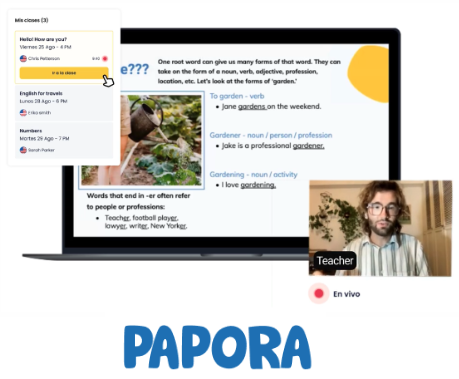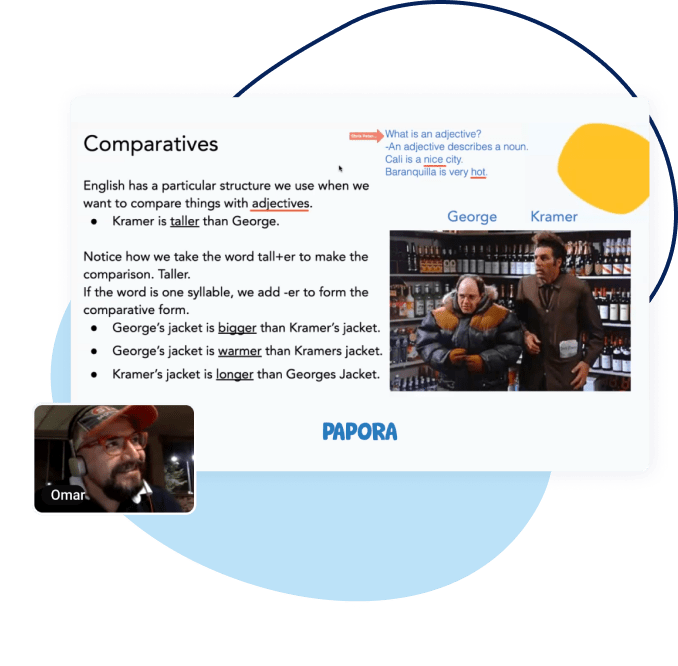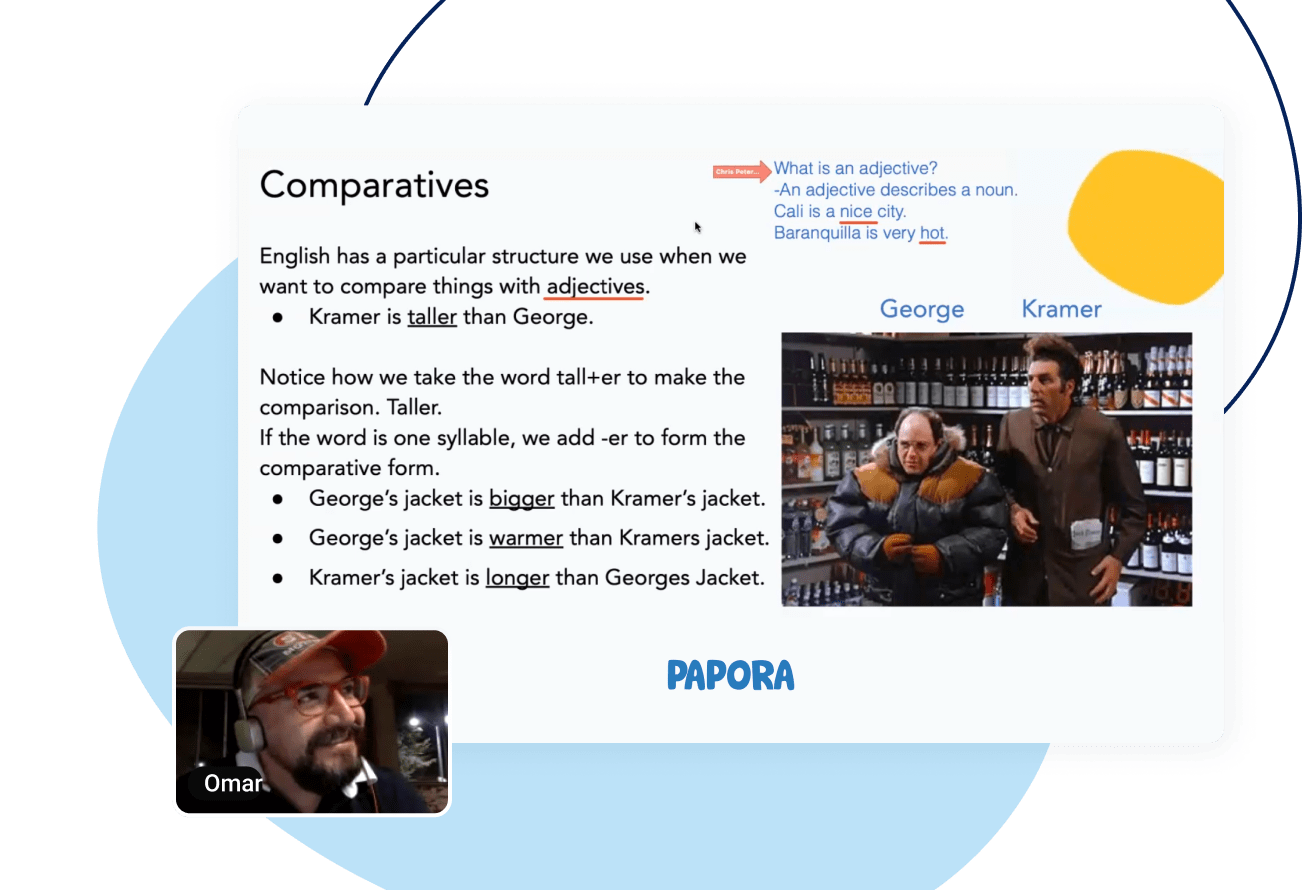Cuando quieras hablar en inglés sobre dónde cenarás o a qué hora te encontrarás con tus amigos, necesitas utilizar el futuro simple.
En esta guía aprenderás cómo formar estas oraciones, su estructura, la diferencia entre “will” y “going to”. Encontrarás ejemplos y algunos ejercicios para practicar. ¡Comencemos!
¿Qué es el futuro simple en inglés?
Es el tiempo verbal con el que hablamos de planes o predicciones en el futuro, sin necesidad de mencionar cuando van a ocurrir.
- We are going to have dinner at a Peruvian restaurant. - Vamos a cenar en un restaurante peruano.
- We won’t drive to the restaurant. - No vamos a manejar al restaurante.
Puedes ver que hay dos formas comunes de hablar en el futuro simple: “will” y “going to”.
Recuerda que sí quieres conocer más sobre los tiempos verbales en inglés puedes leer nuestras guías personalizadas sobre el presente perfecto, pasado continuo en inglés, y el presente continuo.
¿No sabes por dónde empezar? Descubre tu nivel de inglés
Realiza nuestro test de nivel gratuito y elige las lecciones que mejor van con tus necesidades.
Haz el test

Estructura del futuro simple en inglés
Veamos como construir las oraciones usando ambas variaciones del futuro simple:
Forma positiva
Usamos las formas positivas para hablar de lo que tenemos planeado para el futuro y lo que anticipamos que va a suceder.
Subject + will + verbo + complemento
- She will order a pisco sour. - Ella va a pedir un pisco sour.
- We will see you at dinner! - ¡Te veremos en la cena!
Subject + to be + going to + verbo + complemento
- We are going to share an appetizer. - Vamos a compartir una entrada.
- Susan is going to arrive late. - Susan va a llegar tarde.
Forma negativa
Aplicamos esta forma cuando no planeamos hacer algo en el futuro o creemos que algo no va a suceder.
Subject + won’t / will not + verbo + complemento
- We will not pay in cash. - No vamos a pagar en efectivo.
- He won’t drink much tonight. - No va a tomar mucho esta noche.
Subject + to be + not + going to + verbo + complemento
- They are not going to walk to the restaurant. - No van a caminar al restaurante.
- I am not going to order dessert. - No voy a pedir un postre.
Forma interrogativa
Para hacer una pregunta sobre planes o eventos en el futuro, hay que alterar el orden del sujeto y “will” o “to be”.
- Will he come to dinner? ¿Va a venir a la cena?
- Are they going to pay for the meal? - ¿Van a pagar por la comida?
Conjugación del futuro simple con “will”
| Forma | Inglés | Español |
|---|---|---|
| Will - Positive | I will eat dinner. | Cenaré. |
| Will - Positive Contraction | I’ll eat dinner. | Cenaré. |
| Will - Negative | I will not eat dinner. | No cenaré. |
| Will - Negative Contraction | I won’t eat dinner. | No cenaré. |
| Will - Question | Will I eat dinner? | ¿Cenaré? |
| Will - Positive (You) | You will eat dinner. | Cenarás. |
| Will - Positive Contraction (You) | You’ll eat dinner. | Cenarás. |
| Will - Negative (You) | You will not eat dinner. | No cenarás. |
| Will - Negative Contraction (You) | You won’t eat dinner. | No cenarás. |
| Will - Question (You) | Will you eat dinner? | ¿Cenarás? |
| Will - Positive (He) | He will eat dinner. | Cenará. |
| Will - Positive Contraction (He) | He’ll eat dinner. | Cenará. |
| Will - Negative (He) | He will not eat dinner. | No cenará. |
| Will - Negative Contraction (He) | He won’t eat dinner. | No cenará. |
| Will - Question (He) | Will he eat dinner? | ¿Cenará? |
| Will - Positive (She) | She will eat dinner. | Cenará. |
| Will - Positive Contraction (She) | She’ll eat dinner. | Cenará. |
| Will - Negative (She) | She will not eat dinner. | No cenará. |
| Will - Negative Contraction (She) | She won’t eat dinner. | No cenará. |
| Will - Question (She) | Will she eat dinner? | ¿Cenará? |
| Will - Positive (We) | We will eat dinner. | Cenaremos. |
| Will - Positive Contraction (We) | We’ll eat dinner. | Cenaremos. |
| Will - Negative (We) | We will not eat dinner. | No cenaremos. |
| Will - Negative Contraction (We) | We won’t eat dinner. | No cenaremos. |
| Will - Question (We) | Will we eat dinner? | ¿Cenaremos? |
| Will - Positive (They) | They will eat dinner. | Cenarán. |
| Will - Positive Contraction (They) | They’ll eat dinner. | Cenarán. |
| Will - Negative (They) | They will not eat dinner. | No cenarán. |
| Will - Negative Contraction (They) | They won’t eat dinner. | No cenarán. |
| Will - Question (They) | Will they eat dinner? | ¿Cenarán? |
Perfecciona tu uso del futuro simple en Papora
Únete a Papora y aprende a hablar sobre tus planes y predicciones en inglés sin complicaciones.
Regístrate aquí

Conjugación del futuro simple con “going to”
| Forma | Inglés | Español |
|---|---|---|
| Going to - Positive | I am going to eat dinner. | Voy a cenar. |
| Going to - Positive Contraction | I’m going to eat dinner. | Voy a cenar. |
| Going to - Negative | I am not going to eat dinner. | No voy a cenar. |
| Going to - Negative Contraction | I’m not going to eat dinner. / I’m not going to eat dinner. | No voy a cenar. |
| Going to - Question | Am I going to eat dinner? | ¿Voy a cenar? |
| Going to - Positive (You) | You are going to eat dinner. | Vas a cenar. |
| Going to - Positive Contraction (You) | You’re going to eat dinner. | Vas a cenar. |
| Going to - Negative (You) | You are not going to eat dinner. | No vas a cenar. |
| Going to - Negative Contraction (You) | You’re not going to eat dinner. / You aren’t going to eat dinner. | No vas a cenar. |
| Going to - Question (You) | Are you going to eat dinner? | ¿Vas a cenar? |
| Going to - Positive (He) | He is going to eat dinner. | Va a cenar. |
| Going to - Positive Contraction (He) | He’s going to eat dinner. | Va a cenar. |
| Going to - Negative (He) | He is not going to eat dinner. | No va a cenar. |
| Going to - Negative Contraction (He) | He’s not going to eat dinner. / He isn’t going to eat dinner. | No va a cenar. |
| Going to - Question (He) | Is he going to eat dinner? | ¿Va a cenar? |
| Going to - Positive (She) | She is going to eat dinner. | Va a cenar. |
| Going to - Positive Contraction (She) | She’s going to eat dinner. | Va a cenar. |
| Going to - Negative (She) | She is not going to eat dinner. | No va a cenar. |
| Going to - Negative Contraction (She) | She’s not going to eat dinner. / She isn’t going to eat dinner. | No va a cenar. |
| Going to - Question (She) | Is she going to eat dinner? | ¿Va a cenar? |
| Going to - Positive (We) | We are going to eat dinner. | Vamos a cenar. |
| Going to - Positive Contraction (We) | We’re going to eat dinner. | Vamos a cenar. |
| Going to - Negative (We) | We are not going to eat dinner. | No vamos a cenar. |
| Going to - Negative Contraction (We) | We’re not going to eat dinner. / We aren’t going to eat dinner. | No vamos a cenar. |
| Going to - Question (We) | Are we going to eat dinner? | ¿Vamos a cenar? |
| Going to - Positive (They) | They are going to eat dinner. | Van a cenar. |
| Going to - Positive Contraction (They) | They’re going to eat dinner. | Van a cenar. |
| Going to - Negative (They) | They are not going to eat dinner. | No van a cenar. |
| Going to - Negative Contraction (They) | They’re not going to eat dinner. / They aren’t going to eat dinner. | No van a cenar. |
| Going to - Question (They) | Are they going to eat dinner? | ¿Van a cenar? |
¿Cuándo se usa “Will” y cuándo se usa “Going To”?
En la mayoría de los casos, se puede usar “will” y “going to” indistintamente, siendo la primera opción la más común.
- Janet will cook dinner. - Janet va a cocinar la cena.
- Janet is going to cook dinner. - Janet va a cocinar la cena.
Sin embargo, existen algunas distinciones sutiles que puedes considerar. Cuando usamos “will” hablamos de un futuro incierto, mientras que “going to” es el indicado para hablar de eventos más seguros o planificados.
- We aren’t going to order anything expensive. - No vamos a pedir nada caro.
- We won’t order anything expensive. - No vamos a pedir nada caro.
Aprende más sobre el uso de will y going to leyendo nuestra guía.
Errores comunes al usar el futuro simple
Un error común ocurre cuando se usa “going to” y olvidamos incluir el verbo “to be”. Por ejemplo:
Voy a jugar futbol.
- I going to play soccer. ❌
- I am going to play soccer. ✅
- I will play soccer. ✅
Ella me va a visitar.
- She going to visit me. ❌
- She is going to visit me. ✅
- She will visit me. ✅
Otro error es utilizar el presente simple para hablar del futuro y olvidar el uso de “will” y “going to”. Por ejemplo:
Mañana voy a ir al centro comercial.
- Tomorrow I go to the mall. ❌
- Tomorrow, I am going to go to the mall. ✅
- Tomorrow, I will go to the mall. ✅
Vamos a viajar a Guatemala en diciembre.
- We travel to Guatemala in December. ❌
- We will travel to Guatemala in December. ✅
- We are going to travel to Guatemala in December.✅
Ejercicios
Aquí te dejamos algunos ejercicios para que practiques:
- Sam ________________ study tonight. (going to, study, positivo).
- We ________________ cook salmon for dinner. (going to, cook, negativo).
- ____ you _____________ with us? (will, come, interrogativo).
- Dave and Maria _____________ at the party. (will, drink, negativo).
- ____ she _____________ order delivery? (going to, order, interrogativo).
- You _________________ home. (going to, drive, negativo).
- I _________________ you later! (will, see, positive).
- ____ they ____________ bring a bottle of wine? (going to, bring, interrogativo).
- Betty and Mark ____________ a new house. (will, buy, positivo).
Puedes ver las respuestas al finalizar, en caso de que necesites ayuda.
El mejor consejo: Aprende inglés con Papora
Ya sabes que es el futuro simple y cómo se utiliza, pero ahora es momento de aplicarlo en tu vida cotidiana. Para esto, te recomendamos aprender a través de la plataforma online de Papora.
Hablamos de un curso que te ofrece clases ilimitadas al mes con profesores de nivel nativo con quienes podrás conversar en vivo a través de videollamadas. Estudiarás en grupos pequeños y con una gran variedad de horarios.
Nuestra prioridad es adaptarnos a tu ritmo de aprendizaje para que domines el idioma sin presiones. Al finalizar, obtendrás un nivel intermedio B1 según el Marco Común Europeo.
1) is going to, 2) are going to, 3) Will… come, 4) will not drink, 5) Is… going to, 6) are not going to drive home, 7) will see, 8) Are… going to, 9) will buy.
Haz que el inglés sea fácil. Aprende con Papora
Con nuestras clases en Papora, dominarás el futuro simple y estarás listo para cualquier conversación
Empieza ya

Preguntas frecuentes sobre Futuro simple
El orden de las palabras es muy importante en inglés y esto pasa en todos los tiempos verbales. Lo usamos para ayudar a indicar la diferencia entre una pregunta y una oración normal.
Coloquialmente, casi no existen diferencias y sus significados son muy similares. Sin embargo, podemos usar “will” cuando el futuro es incierto, y “going to” cuando tienes más seguridad sobre tu predicción.





